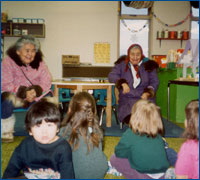"Every time an Elder dies, it is like a library has burned down."
-African Proverb
| Oral History Main Page Documentation and Dissemination of Oral History Bringing Oral History to the Classroom References Back to Ms. McKeen's Homepage |
   |
|
What is an Oral Tradition?
Oral traditions are an important part of many cultures. For example, for many years all the Aboriginal peoples in the Northwest Territories taught future generations the skills necessary for survival, such as hunting and other food gathering, making shelters and clothes, and other important social skills and crafts, through oral traditions.3 The Bantu people of West Africa use riddles as one way to educate their children. These riddles represent an important skill for "for children’s fuller participation in the social, cultural, political, and economic life of African communities."5 Oral traditions have been around much longer than the written word, in the form of poetry, song, tales and other recitations. Even after writing was developed and became prevalent in many cultures, oral traditions are still a vital part of many cultures.1 To disregard these traditions as invaluable or primitive would be to make a huge error in judgement and to miss out on a wealth of knowledge and information. In cultures where oral
traditions are prevalent, the elders are very important to the tribe
because they are believed to hold more knowledge than other members of
the community. This belief is almost always true as well, for with oral
tradition experience is knowledge and who but the eldest would have the
most experience? The elders are therefore the educators of younger
generations and pass on their knowledge to their pupils.2
Oral traditions, because they are passed down from person to person, also have the characteristic of being variable, from performance to performance and from person to person.1 Unlike written knowledge which is in one form no matter what the context in which it is read and learner, oral knowledge is highly effected by the context in which it is presented and so will be slightly different in different circumstances and with different people.2 This does not mean that we should disregard the information and knowledge that oral traditions contain, just that we need to be aware of the ways in which this information is different than the written knowledge that we encounter in everyday life. These differences are an important part of what an oral tradition is and so should be valued as well. |